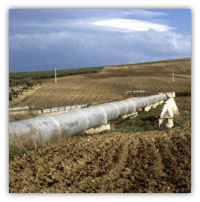 The Case Study is aimed at assessing technologies for enhancing the eco-efficiency of water use in the agricultural sector, and concerns the Sinistra Ofanto Irrigation Scheme, in Southeastern Italy.
The Case Study is aimed at assessing technologies for enhancing the eco-efficiency of water use in the agricultural sector, and concerns the Sinistra Ofanto Irrigation Scheme, in Southeastern Italy.
Irrigation demand in the Sinistra Ofanto area is increasing and supply is no longer sufficient to match demand under the conditions assumed at the design stage. Hence, the performance of the water delivery network is worsening, the system suffers from inadequate discharge and pressure, and irrigation pumps work out of their optimal efficiency range increasing energy consumption and the cost of agricultural products. Moreover, during peak periods, a restriction in water delivery is imposed. As a result, farmers abstract groundwater from the local wells, and surface water directly from the Ofanto River. The massive uncontrolled withdrawal of groundwater periodically causes excessive drops of the groundwater table, saltwater intrusion in the aquifers, and subsequently results in the use of salty water for irrigation with degradation of soil quality. Overall, the excessive exploitation of water resources causes reduction of water quantity and degradation of surface and groundwater quality, compromising the conditions of ecosystems. The application of conventional fertilizers and pesticides causes leaching of residues in receptors and degradation of soil and water quality. The above environmental issues have notable socio-economic relevance, affecting agricultural production, long-term sustainability and economic growth in the area.
The assessment in EcoWater will be based on a set of indicators considering multiple factors, including technical (engineering and agronomic), environmental and economic aspects of irrigation water management and agricultural production. It will further address the entire chain of water transport from the source to the application in the field, and drainage from the soil into nearby water receptors.
Indicators and analytical assessments will be used to assess technologies concerning water saving, reduction in energy consumption, and eco-friendly agronomic practices.
Read more...
Documents and other resources
Deliverable 2.1: Value Chain Mapping of the Agricultural Water Systems [PDF, 4.6MB]